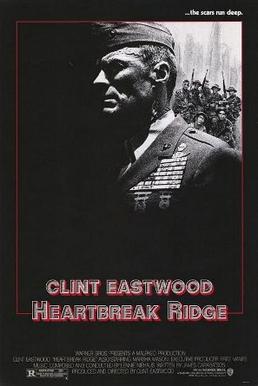After the success of “Top Gun” as a recruiting tool for the Navy, all the other services were hoping to strike gold too. Clint Eastwood came to the Army with a script for a patriotic flag-waver. “Heartbreak Ridge” had Clint as Sgt. Highway, a hard-drinking holdover from the old army. He is tasked with molding a platoon of misfits into a fighting force and then leading them to victory in a modern war – Grenada. Eastwood requested Army cooperation with extras and equipment and use of Ft. Bragg for filming. Highway’s platoon was to be in the 82nd Airborne. When the person in charge of vetting movie scripts received the rough draft, there were huge problems with it. Eastwood was given a long list of complaints that would have required an almost complete rewrite. The script was deemed highly unfavorable in its depiction of the new all-volunteer Army. Highway’s commanding officer is a villain who is only interested in winning mock battles. His charges are caricatures of the new generation of recruits and yet fit stereotypes from WWII war films. The language was too offensive. Highway abused the men. For example, he rips the ear-ring out of one of them. There were numerous historical and factual mistakes, including the title. Heartbreak Ridge was a battle that occurred in Korea. The Army public relations officer also took umbrage with the demeaning attitude towards women. The movie opens with a jail cell scene where Highway not only uses foul language, but makes cracks about women. In need of cooperation to cut costs and increase realism, he promised to make revisions to the script. However, when the revised script arrived, it was virtually unchanged. When the Army said it could not cooperate with the production unless substantial changes were made, Eastwood shot back that he would not make those changes and threatened to make the movie without Army cooperation, thus implying that the finished product would be more detrimental to the Army than if they came on board. The Army refused to back down and Eastwood moved on to the Marines.
The Corps had already had its “Top Gun” with “Sands of Iwo Jima” and had always been the branch that was most open to cooperation with filmmakers. Eastwood changed Highway into a Marine Gunnery Sergeant and the platoon became a Marine recon unit. As far as his portrayal of the old school Highway, he correctly pointed out that he was little different from the Marine icon Sgt. Stryker. The Marines had similar problems with the script that the Army had had, but authorized use of Camp Pendleton with the understanding that Eastwood would make the suggested changes to the script. In addition to the Army’s language and attitude complaints, the Marines insisted the Corps would have dealt empathetically with a Marine’s drinking problem. Most of the problems were with the Grenada scenes. It did not like the scene where a credit card had to be used to make a phone call during the battle. It did not want Marines rescuing students since that was an Army unit. No Marine had died in combat on Grenada, so none should die in the movie. The Corps suggested it would make sense to set the movie on a fictional island. Eastwood implied he would make appropriate changes and agreed to having a technical adviser on set. Eastwood also caught grief from Korean War Army veterans who were offended with the title because Heartbreak Ridge was a famous Army battle with heavy casualties. Eastwood did change the back-story for Highway to make him an Army vet who had joined the Marines after leaving the Army, but refused to change the title.
When the finished cut of the film arrived to be screened by Marine Corps officials, they were shocked to find Eastwood had made few changes. In fact, the movie had added a scene where Highway shoots an enemy in the back, twice. The technical adviser had apparently not had the balls to stand up to Eastwood and had allowed the director to shoot the script that his bosses had told him was unacceptable. The Marines refused to allow Eastwood to credit the Marines with cooperation, but he had the last laugh because he had gotten that cooperation. The Marines established a policy that all future scripts had to get written approval before cooperation ensued. It refused to permit the planned opening of the film at Camp Pendleton. In the end, the Marines were right to disavow the movie as it was a turkey and an embarrassment. The Corps was a bit too prudish and unrealistic about the language, but the complaints about the accuracy and the portrayal of the Corps were justified.

No comments:
Post a Comment
Please fell free to comment. I would love to hear what you think and will respond.